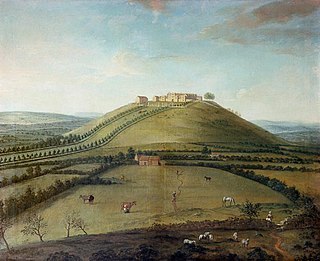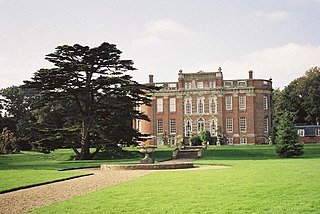Nicholas Fazakerley (1685?-1767), of Prescot, Merseyside, was an English lawyer and politician who sat in the House of Commons from 1732 to 1767.
Contents

Nicholas Fazakerley (1685?-1767), of Prescot, Merseyside, was an English lawyer and politician who sat in the House of Commons from 1732 to 1767.

Fazakerley was the son of Henry Fazakerley, of Fazakerley, near Liverpool. [1] He was probably at Eton College in 1698 and matriculated at Brasenose College, Oxford on 12 March 1702, aged 17. He was admitted at Middle Temple in 1700, and was called to the bar in 1707. [2] On 9 February 1714 he was admitted of the Inner Temple from Middle Temple. [3] He married Ann Lutwyche, daughter of Sir Thomas Lutwyche, MP, on 10 October 1723. [4]
At first Fazakerley practised chiefly in chambers as an equity counsel, but as his practice grew he began to appear not only in the equity court, but in the courts of common law, mostly to argue questions connected with conveyancing and the transfer of real property. Occasionally his knowledge of constitutional law led him to be retained in state trials.
Among his cases was the trial of Richard Francklin, a Fleet Street bookseller, on 3 December 1731, for publishing in The Craftsman of 2 January the letter from The Hague said to have been written by Lord Bolingbroke. Fazakerley was retained along with Thomas Bootle for the defence, and, in the words of Lord Mansfield, 'started every objection and laboured every point as if the fate of the empire had been at stake'. [5]
Fazakerley became a Bencher of Lincoln's Inn in 1736 and was counsel to Cambridge University from 1738 to 1757. In August 1742 he was appointed recorder of Preston, an office he held for the rest of his life. [4] His politics, however, prevented his attaining the honours of his profession and he never became K.C.
Fazakerley was elected in a contest as Tory Member of Parliament for Preston at a by-election on 24 January 1732 and retained his seat unopposed at the 1734 British general election two years later. [4] He was a Jacobite of the cautious type. He was listened to with attention, and by a section of his party came to be regarded as a leader. [6] In a debate on the convention with Spain, 9 March 1739, whereby peace was secured on payment by the Spanish government of a compensation to English traders, he declared that if Sir Robert Walpole 'were determined to carry it by a majority, he would never again appear in the house till he perceived a change of measures'. [7] He was returned at the head of the poll in the contested election of 1741 and returned unopposed in 1747. [4] He also distinguished himself in the debates in May 1751, on Lord Hardwicke's Regency Bill, especially by his resolute opposition to the marriage clause. [8] There is a story that Walpole prevailed on Hardwicke, then Sir Philip Yorke, to quit the chief justiceship for the chancellorship, by the declaration: 'If by one o'clock you do not accept my offer, Fazakerley by two becomes lord keeper of the great seal, and one of the staunchest whigs in all England!’. [9] Another of his speeches which attracted attention was that delivered against the Jews' Naturalisation Bill, 7 May 1753.
Fazakerley was returned unopposed as Tory MP for Preston in the general elections of 1754 and 1761. [10]
Fazakerley died at his house in Grosvenor Street, London, in February 1767, predeceased by both his children. His son died on 30 June 1737. His daughter, Elizabeth, married, with a dowry of £16,000, Lord Tretham on 23 December 1744. She died on 19 May 1745. [4]

Spencer Compton, 1st Earl of Wilmington, was a British Whig statesman who served continuously in government from 1715 until his death. He sat in the English and British House of Commons between 1698 and 1728, and was then raised to the peerage and sat in the House of Lords. He served as the prime minister of Great Britain from 1742 until his death in 1743. He is considered to have been Britain's second prime minister, after Robert Walpole, but worked closely with the Secretary of State, Lord Carteret, in order to secure the support of the various factions making up the government.

Philip Yorke, 1st Earl of Hardwicke, was an English lawyer and politician who served as Lord High Chancellor of Great Britain. He was a close confidant of the Duke of Newcastle, Prime Minister between 1754 and 1756 and 1757 until 1762.

Lieutenant Colonel Sidney Godolphin (1652–1732) was a soldier and politician from Cornwall and Member of Parliament for various seats between 1685 and 1732, becoming Father of the House in 1730. He also reached the rank of Lieutenant Colonel and was Governor of Scilly from 1700 until his death in September 1732.

John Morton was an English lawyer and Tory politician who sat in the House of Commons between 1747 to 1780.

William Bromley of Baginton, Warwickshire, was an English Tory politician who sat in the English and British House of Commons between 1690 and 1732. He was Speaker of the House of Commons of Great Britain from 1710 to 1713 and Secretary of State for the Northern Department from 1713 to 1714.

Sir John Evelyn, 2nd Baronet was a British courtier and Whig politician who sat in the House of Commons for 40 years from 1727 to 1767.
Herbert Mackworth was a Welsh landowner, coal owner and Tory politician who sat in the House of Commons from 1739 to 1765.
Henry Fleetwood of Penwortham, near Preston, Lancashire, was an English soldier and Tory politician who sat in the House of Commons from 1708 to 1722.

William Noel was an English barrister, judge and politician who sat in the House of Commons for 35 years from 1722 to 1757.
Francis Annesley, FRS was an Irish lawyer and politician who sat in the Irish House of Commons between 1692 and 1714, in the English House of Commons from 1705 to 1708 and in the British House of Commons between 1708 and 1734.
Thomas Lutwyche of the Inner Temple and Lutwyche Hall, Shropshire, was an English lawyer and Tory politician who sat in the House of Commons almost continuously from 1710 to 1734.

Sir Henry Hoghton, 5th Baronet (c.1678–1768) of Hoghton Tower, Lancashire was a British politician who sat in the House of Commons between 1710 and 1741. He had strong dissenting religious views which sustained his militancy against the Jacobite rebellions.
Charles Pelham of Brocklesby, Lincolnshire, was a British landowner and Tory politician who sat in the House of Commons for 28 years between 1722 and 1754.

Richard Lyster of Rowton Castle, Shropshire, was a British landowner and Tory politician who sat in the House of Commons for 34 years between 1722 and 1766
Charles Cholmondeley of Vale Royal, Cheshire, was a British landowner and Tory politician who sat in the House of Commons between 1710 and 1756.

George Chafin or Chaffin, of Chettle House, Dorset, England, was a British landowner and Tory politician who sat in the House of Commons from 1713 to 1754.
William Newland, of Gatton, Surrey and St James's Park, Westminster, was a British lawyer and Tory politician who sat in the House of Commons from 1710 to 1738.
Robert Vyner (1686–1777) of Swakeleys, Middlesex, and Gautby, Lincolnshire, was a British politician who sat in the House of Commons for 27 years between 1710 and 1761.
James Cocks, of Reigate, Surrey, was a British lawyer and Whig politician who sat in the House of Commons between 1707 and 1747.
Peter Bold (c.1705–1762) of Bold Hall in Prescot, Lancashire, was a British landowner and Tory politician who sat in the House of Commons between 1727 and 1761.
![]() This article incorporates text from a publication now in the public domain : Stephen, Leslie, ed. (1889). "Fazakerley, Nicholas". Dictionary of National Biography . Vol. 18. London: Smith, Elder & Co.
This article incorporates text from a publication now in the public domain : Stephen, Leslie, ed. (1889). "Fazakerley, Nicholas". Dictionary of National Biography . Vol. 18. London: Smith, Elder & Co.